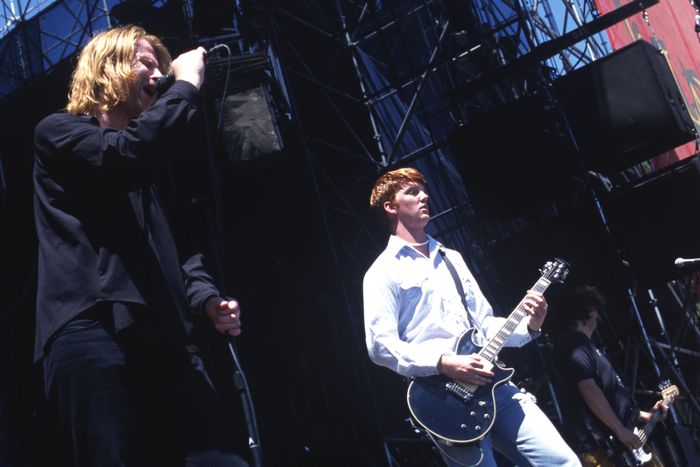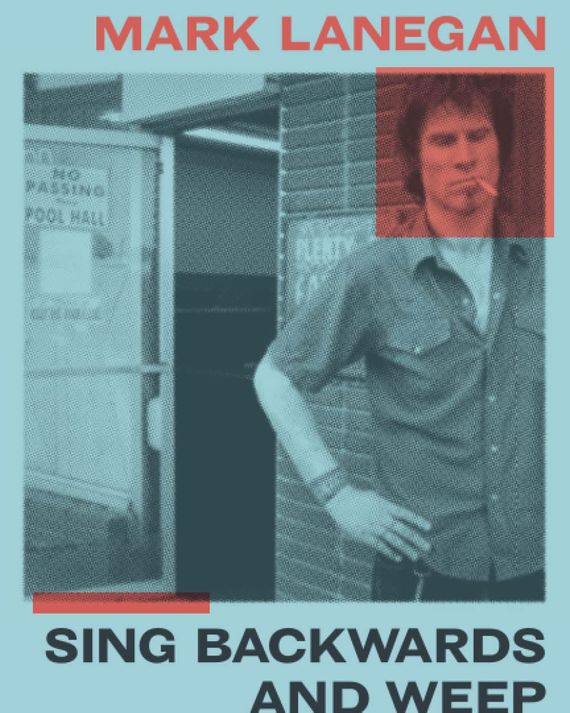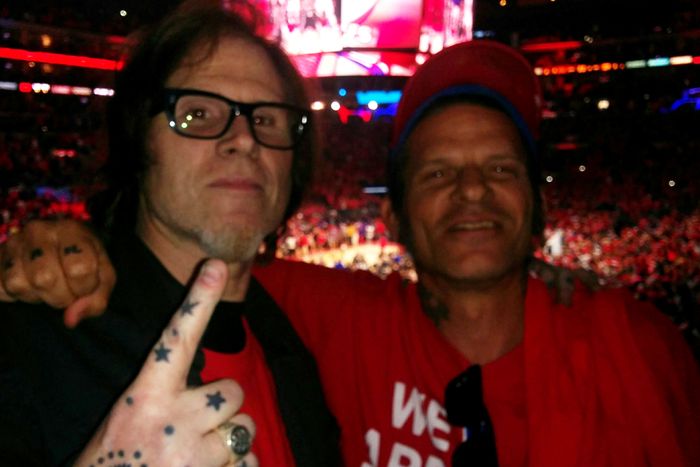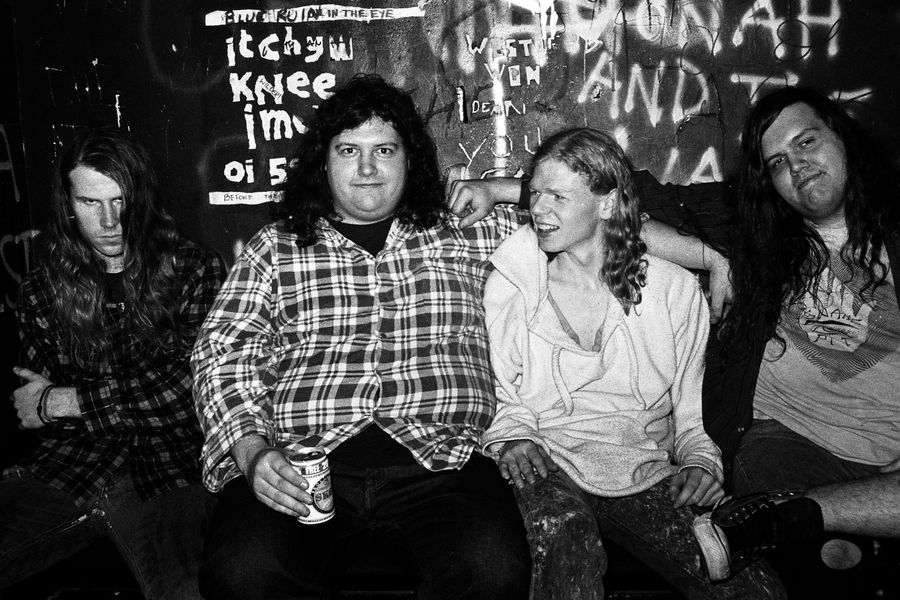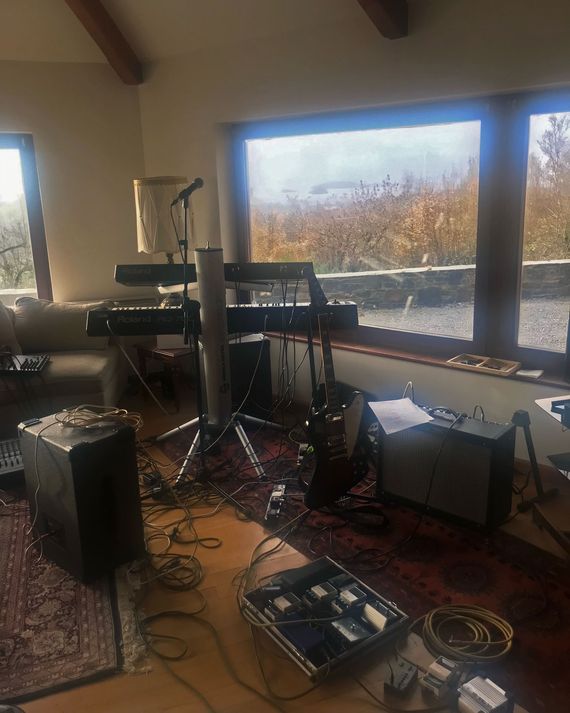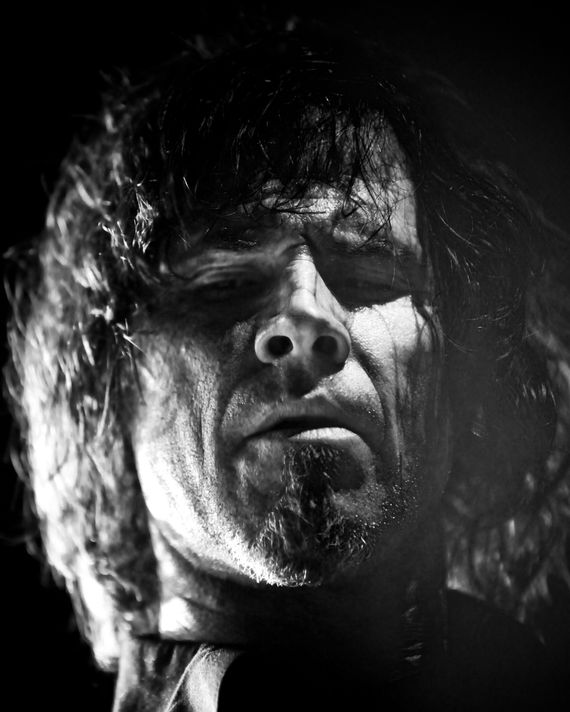
When Mark Lanegan died on February 22 in Killarney, Ireland, shock and disbelief hit not only the music community, but Lanegan’s friends and collaborators. As immortalized in his harrowing warts-and-all memoir Sing Backwards and Weep, could the man who had cheated death numerous times, be it from intravenous drug infection, myriad addictions (Lanegan credits heroin for saving him from chronic alcoholism), or a COVID-induced coma, really be gone? As tributes poured in, fans, fellow musicians, and celebrity admirers mourned a songwriter whose sandpaper baritone had gotten them through the hard times, along with an almost mythical figure that continues to loom large over the lives he touched.
Born to an abusive mother and kindly schoolteacher father who could never control his son, the Screaming Trees front man spent his formative years in the logging town of Ellensburg, Washington, wreaking underage havoc. By his own admission, at age 12, Lanegan was “a compulsive gambler, a fledgling alcoholic, a thief, a porno fiend.” Before 20, he had amassed a significant criminal record that included breaking and entering, shoplifting, drug possession, vandalism, insurance fraud, and 26 counts of underage drinking. An early fan of Iggy Pop, the Gun Club, and his favorite, Joy Division, Lanegan found a desperate release in music, particularly songs shaded in darkness with beauty creeping in through the cracks.
“Dark Mark” remained a cult figure throughout his extremely prolific career, which featured eight albums with his proto-grunge group Screaming Trees, 12 solo records, and a host of critically acclaimed collaborations, including with Josh Homme’s Queens of the Stone Age, the Gutter Twins with Greg Dulli, and alt supergroup Mad Season featuring Alice in Chains’ Layne Staley and Pearl Jam’s Mike McCready. His influence continues to be felt today, from the neo-psych of King Gizzard & the Lizard Wizard to the darkly gothic sounds of Cold Cave. In the weeks following Lanegan’s death, Vulture caught up with his close friends and collaborators for a tribute to the man who let very few into his inner circle.
‘Collaborations were the best gift he had to give to people he cared about’
Joe Cardamone, the Icarus Line, Dark Mark and Skeleton Joe: He was a genuine spirit. There was the myth created around his persona, and then there was the guy I knew. In this line of work, there’s all kinds of characters and only a handful that I’ve seen eye to eye with. When you meet your own kind, it’s only natural to latch on to each other. It makes the abyss of the music business a little less lonely. People always tend to focus on the drugs and shit like that, but it had nothing to do with my relationship with Mark. I saw his collaborations with me as a gift. He was so fucking generous, and would give whatever he could to help someone he cared about. Often, all he had to give were his collaborations. I had never really looked at it that way, and only through my own stilted perspective. I’m not so much a collaborator and keep to myself. I looked at it as a compromise I made to branch out to different communities. That was my own selfish, creative perspective. Standing back and looking at what Mark did with me and his greater body of work, his collaborations were the best gift he had to give to people he cared about. That’s what it was all about. He was lending what he had of value to lift up people he cared about. He was a fucking music fan in a real way.
Moby, singer and producer: I was beginning to work on this album called Innocents that was going to have a bunch of different singers, and I wanted to have Mark on the record. I’m a small person and not very brave, but when it comes to pursuing people with amazing voices, I put aside my cowardice and become pretty hyperfocused in pursuing people. I went up to him backstage and I was very nervous. I said, “My name’s Moby and I loved that version of the Gun Club song you did.” And immediately, he became the sweetest person on the planet. This was very surprising to me, and maybe he was just being nice, but it turned out he actually liked my music. My assumption was that there was no world in which cool, dark, intimidating Mark Lanegan even knew who I was.
I played him some music I was working on and gave him an instrumental. He took it home, and a few days later he came back to my studio. Everything had been written perfectly. Everything was prepared. He did his vocals in one take and there was no need to do it again because his work ethic was phenomenal. We finished this song and we just kept meeting up as friends and kept working on music that never came to fruition. But this one song called “The Lonely Night” got released on Innocents and it has such a poignancy to it. It’s just a very beautiful, poetic look at some pretty dark stuff.
John Cale, Velvet Underground co-founder: Okay, let me see if I can set this up the right way. This is the first time Mark and I worked together. My band and I were starting preproduction rehearsals for the very first of my Nico tribute concerts in 2008. I’d recently had the good fortune to build out my own private studio space, but it wasn’t completed and we had to scramble to find a rehearsal room to start working on the show. Since Mark was based in L.A. at the time, I’d invited him to stop by and start working on a couple of Nico songs I’d earmarked for him. He was sent the songs before rehearsal with the proviso that I was planning to rework the arrangements a bit, but we’d really get going on the new arrangements once he arrived. Everything was kind of a mess, to be honest. It was during peak touring season and all the good rehearsal rooms were booked up on the days we needed them, so we went another route and found a small, theatrical playhouse, white-box space. Of course, nothing was in it. Nothing! No PA, no mixer, no wedges, no DI boxes, mics, cables, stands, not even power outlets.
Eventually, we borrowed, rented, purchased enough elements so we could finally plug in our instruments and alas, we had sound! By the time we started playing anything resembling music, we were totally fried and ridiculously silly. We were so caught up in our own technical drama that we didn’t notice that Mark was supposed to have arrived about an hour ago. We began playing the two songs that Mark would rehearse and, as I said, we were not exactly at our best. We got a basic arrangement of Nico’s “Roses in the Snow” going, and we needed to pitch things down into Mark’s vocal range. I began singing in my lower range, then lower, and even lower. At one point, the whole band started singing with me and in walks Mark while we’re all doing our best/worst Mark Lanegan imitations. He started cracking up and told us he’d been so nervous about rehearsing with me that he’d been walking around the block in circles, smoking and sweating profusely for an hour, trying to get the courage to actually come in.
Peter Hook, Joy Division/New Order: When my son was a teenager, he was into much different music than I’d ever been into. He was into grunge and bands like Metallica and Queens of the Stone Age. As a parent, I made the mistake of letting him use my iTunes, which was everything in the old days, to download whatever music he wanted. On a walk or jog, I started listening to all of his music, thinking, Oh my God. What the fuck is this? One of the people I was listening to was Mark Lanegan, but I didn’t know who the hell it was. I loved it, though.
Years later, when I was playing as Peter Hook and the Light and doing Joy Division songs, my son Jack was playing bass. He said, “There’s loads of great musicians that are massive Joy Division fans, Dad. Why don’t we ask them to play with us?” I was like, “What? Are you mad?” Jack mentioned Moby, Perry Farrell, and Mark Lanegan. I still didn’t have a clue who he was or where he’d come from. I respect Jack’s opinion, and he said, “Lanegan’s playing tonight in Manchester. Why don’t you check him out with me?” I went down, and lo and behold, I knew nearly every song. I realized Lanegan was the guy I’d been listening to for years, wondering who the hell it was, on my many jogging sessions. We met that night, and the next time he came to town, he asked me to play with him, which was a great honor. We did “Transmission,” “Atmosphere,” and, I think, “Love Will Tear Us Apart.” Then, when we were in America, Mark would come and play with us. I think he played with us four or five times, and we became friends.
Moby, singer and producer: I got approached by Deutsche Grammophon to do an orchestral greatest-hits album because I had done an orchestral show with the L.A. Philharmonic. Somewhere in my head I thought it would be amazing to have a duet between Kris Kristofferson and Mark Lanegan. I’ve had a lot of vocalists I’ve reached out to say either they’re not interested, or they don’t get back to me. Or they say they’ll do something in five years when they’re free. But Kris, I sent him the music, he loved it, and two days later sent me his finished vocals. I combined his vocals with Lanegan’s and I wrote the orchestral score and then had an arranger turn my version of an orchestral score into something that could be played by an orchestra. Once the orchestral version was mixed, I sent it to Mark and I didn’t hear from him. I thought it was odd because we were in pretty steady contact and he was very responsive. I finally heard back from him and he told me that he’d been in a coma. He said when he heard the orchestral version of “The Lonely Night” with him and Kris Kristofferson, he cried. We released the record and when I reached out to send him copies of it, I found out that he had died. What really gets me is that I can’t imagine Mark Lanegan, the dark prince, this tough, intimidating guy, crying very often.
I don’t know if you’ve heard the version of “The Lonely Night” with Kristofferson, but my challenge to anyone reading this is to listen to it without crying. It’s got my name on it, but it’s Mark and Kris. I’m just the weirdo. I’m the technician in the background. I hope that anyone listening to it doesn’t think of it as my song. Mark wrote the lyrics and it’s such an earnest, beautiful song. I had no involvement in the lyrics. I can’t take any credit for them except for being grateful that I was able to work with him on this piece of music.
Joe Cardamone, the Icarus Line, Dark Mark and Skeleton Joe: For our [Dark Mark and Skeleton Joe] record, I’d create an instrumental by myself and send it to him. He was really fast, and most times I’d get a voice message from him the next morning singing into his phone over the music. Sometimes within hours, and that was it. We’d pop into the studio, commit a vocal, and I’d finish up whatever needed to be done. It was beautiful, man. I still have all the voice messages. He had the gift of having no filter with what he wanted to say and turning it into poetry. That’s all you could want in a lyricist, which is someone divining their experience, in a poetic way, into song. He could do that in a simple, direct way. For that alone, he’s at the top of my list of all-time greats. Mark could sing the phone book and you’d listen. His voice was a unique gift. He was also a great writer, and that’s the fucked-up thing. In the last few years, he had really started taking writing seriously. We were on tour in 2017, and he kept hinting that he might start working on a book. He didn’t think he could do it, as it was a daunting task and a new thing. I remember having dinner with him before a gig and doing my best to egg him on to write it. I told him, “There’s no way you can’t write a book.” I hate rock books, but his reads more like literature.
‘He knew how to drop the reader right into the action’
Ben Schafer, executive editor, Hachette Books: I was dumbstruck by a lot of Mark’s life story, and amazed at how much candor was in the book. In rock-and-roll culture, there’s a lot of stupid romanticization of drugs and hard living. There’s no way you can read Mark’s book and come away thinking there was anything cool, rewarding, or transgressive about addiction to hard drugs. He showed the truth in the brutality of that life. It’s not a rebellious affectation. It’s just desperation, and not a cool trip. In that regard, it’s not a typical rock memoir. Mark hated rock memoirs and bios. The only one he liked was John Phillips’s memoir. Mark’s writing had much more in common with Jim Carroll and Charles Bukowski than Mötley Crüe’s The Dirt.
Mishka Shubaly, Sing Backwards and Weep editor: I think Mark was convinced that he was born bad. When we were writing the book, I sort of delicately poked around to see what had happened to him during his childhood. Specifically, had he been molested, or abused, or raped, or kidnapped, or imprisoned. He said, “I know what you’re getting at and none of that ever happened. When I was a little kid I was so bored. I was such a freak. I had a vision of my life when I was very young and I knew that I would be a freak, an outcast, an outsider, and a junkie.”
We talked about suicide when we were writing the book. I was like, “Mark, you kind of missed your fucking window, bro. Like as bad as shit was, how did you not tap out?” And he said that he had sort of briefly thought about it, but realized that it wasn’t his path. I do think he was death-obsessed, though. I’ve seen some speculation that he killed himself. I think that’s a bunch of fucking bullshit. I think Mark made up his mind early and often that he wanted to live. And the thing that kept him alive was his desire to create. He was determined to keep making shit until somebody forced him to stop.
Hanging out with Mark, it was like standing underneath a high-power transformer, where there’s so much narrative flowing through it. So much poetry, so much darkness, so much light. Just so much energy that you can feel the air around it hum and crackle. And he was such a powerful character just to sit in a room with. It’s like, motherfucker had been dead so many times and come back that it meant that his body had been weakened. But part of me was also convinced that he beat death so many times that Death himself was like a collection agent who figured, “Nah, fuck it. This one’s not worth the trouble.”
Peter Hook, Joy Division/New Order: When I read his book … oh my God. You literally need to put your seat belt on for it. It’s the wildest ride I’ve ever been on as a human being and an author. There’s the truth, and then there’s the absolute, honest, unblemished truth. He laid everything out, all his faults. All his fuckups. Everything. I was so in awe and so proud of him for being able to do that. He was a great guy, and he was one of those rare people that didn’t have to say much, because his very presence made you feel better. There was no showbiz claptrap. He was quiet and cool. In the end, he felt more like a friend than a showbiz friend. His presence was very stoic, but he was a pleasure to be with because he had no agenda. He was very genuine and down-to-earth. The best thing in the world about him was that he did not suffer fools gladly. He was a great musician and lyricist, and a fantastic workaholic.
Ben Schafer, executive editor, Hachette Books: I think Mark was a champion, and he could do anything he put his mind to at the highest level. He had a tremendous, full-on work ethic. He was a really good baseball player in high school. All of his albums are good, and several are great. He never put out a bad record. I think he’s one of the great American voices. I’m perfectly happy saying Sinatra, Sam Cooke, Nina Simone, and Mark Lanegan in the same sentence. He wrote great songs, but when he sang someone else’s songs, he owned it, and that’s what a great vocalist does.
In my life, I’ve been around a lot of people who are really good at what they do, but the real greats aren’t where they are because they’re geniuses. That will only take you so far. I worked in Allen Ginsberg’s office for a number of years, and Christopher Hitchens on a couple of books. They never stopped working, and it was an around-the-clock commitment. They didn’t just work when they felt inspired, or when the muse was delivering some mystical message to their head. Mark never stopped until the end.
Mishka Shubaly, Sing Backwards and Weep editor: He played such a huge role in my life as a hero, a mentor, as a friend, a ball-busting buddy, and a huge pain in my ass. Lanegan and I clashed often and hard. It was really hard on him. I think literature is more important than any one person’s suffering. I really pushed him to walk through the graveyard and to talk to every ghost. I promised him that it would lead to catharsis and a diminishing of his burden. But he said that he never got that relief, and I feel terrible about that.
I knew that doing a book together was going to be an endeavor, but when the hand of destiny knocks on your door, you open it. We had to take that journey together. And I’m so grateful that we did. I will mourn Lanegan until the day that I die. And I will always feel so, so fucking grateful to have been able to tell him that I loved him and that he loved me.
‘He was one of the most fiercely loyal people I’ve ever known’
Donal Logue, actor: By 2019, I’d been through some really difficult personal stuff, and I didn’t know if I could or would want to act again. Greg [Dulli] knew that Mark and I would hit it off, and we did. One thing I loved about Mark was he was wickedly, devilishly funny. Mark was putting out his album Somebody’s Knocking, and they wanted to do a video. I got to reprise my Jimmy the Cab Driver role from it, which was a character I did in the mid-’90s for MTV interstitials. Mark always dug the character, and to bring him back after 25 years was so fun. It was fucking all smiles and laughs because it was improvised, and there’s 15 hours of insanity that was cut. I watched it the other day, and I never watch myself onscreen. I’m one of those people who cringe, but it made me smile. It also ultimately made me so sad. We did stupid shit, and I kind of go-go danced on the roof of an old fucked-up station wagon. And I was scared. Mark thanked me for doing it, but I was like, “I can’t thank you enough for asking me back into an arena that I thought I had to excuse myself from forever.”
Sean Wheeler, pioneering desert rocker: About a week before he died, Mark left me the most clear, beautiful voice message. I was like, “Jesus, he sounds really great.” He told me he loved me, which is funny because I used to love telling him I loved him, and he would hate to say it. He either wouldn’t say it back, or would semi-acknowledge that it was said, or on a good day, he would say, “You too.” But sometimes he would say it. I liked to watch him squirm because I knew how much he did love me back. I might have told him 4,000 times and got ten back.
We met on the Lullabies to Paralyze tour with my band supporting Queens of the Stone Age, and just hit it off. I always hit it off with quiet dudes, because I talk a lot, so it seems like most of my best friends are usually introverted. He was so fucking generous. When he found out I hadn’t done taxes for 15 years, he was like, “Fuck, dude.” He got my taxes taken care of. But our biggest thing was basketball. I had separated with my chick and I was on the couch unresponsive. I had the blues, man. So I made plans to go to a basketball game, which I didn’t give two shits about, with Mark.
He loved basketball. His knowledge of basketball was insane, and I agreed to go because I knew I had to get out of the house. We started going to these Clippers games, and he liked the Clippers because at the time, they were the worst team in the history of sports. The next year we got season tickets, and suddenly I’m fucking super-obsessed and Mark is totally obsessive-compulsive. I have probably 10,000 texts on three phones, all basketball-related. We would obsess on the Clippers year-round, just insane. He was so compulsive. One year there was this dude Hedo Türkoğlu, this Turkish guy, on the team. Mark was like, “Dude, you need a Türkoğlu jersey! Hold on.” Then he would order me the most authentic Hedo stuff he could find. He was crazy like that.
Troy Van Leeuwen, Queens of the Stone Age, producer: After my first show playing with Queens, it felt good and everyone was happy. Dave Grohl said, “Well, it’s my fiancée’s birthday, so let’s take a jet to New York,” which was the next show. I was like, “This is amazing!” I’d never been on a jet or anything. Lanegan didn’t seem to really care. He was just Lanegan. He was never impressed by stuff like that. I’m on the jet with Josh, Nick, and Grohl, and I’m thinking, “Wow, this is really posh.” We’re having a great old time, and Lanegan was in the corner, scowling and trying to sleep. I didn’t know much about him, and didn’t understand his personality yet. I just knew he was this guy in the shadows who would come out, sing, and then bail. I knew he was a dark character that had lived a hard life, but was sober with Queens. The rest of us were all getting wild, drinking and having a good time. I tried to chum up to him, saying, “Dude, we’re on a jet. We’re having fun. Don’t you want to have fun?” And he just stared me down and wouldn’t respond. So, I kept going for him. We finally land, we are in the van, and he leaned over and literally threatened to kill me if I ever tried to chum up to him again. I was like, “Ah, come on, man.” And he really didn’t like that.
We played a couple more shows and Josh was like, “Dude, just leave him alone.” I’m like, “Fair enough.” Over the course of the next few shows, I just let him come to me. And then from that point on, we became really good friends. As we got close, I learned more about his hard life, and that he was always struggling with it. I’ve had plenty of friends go down that dark pathway and never come out. I always respected Mark because he was constantly working. He was constantly writing and constantly putting things out. He had a hustle that would just blindside you.
Dylan Carlson, Earth founder and former Lanegan roommate: I first met Mark in 1986, so he was probably my oldest friend at this point. There was this thing in Olympia called Capitol Lake Jam, and my band was playing with Screaming Trees. They were on SST at the time, and they were one of the most professional bands around, because they had a van and sound guy. We looked at them and thought, “Look, we can actually do this for a living.” They weren’t that much older than us, but they were the elder statesmen because they had been working it longer and harder than the rest of us. That ended up being our last show, and I moved back to Seattle. Mark moved soon after, and we ended up as housemates. That began our long and winding road together.
Drugs came later, as it started off as a musical friendship. He was one of the most fiercely loyal people I’ve ever known. He also had a much bigger heart than he ever wanted anyone to know. He was secretly really sensitive, and a much better person than he ever let himself believe. He could also be self-deprecating to a fault, and one of the most wickedly funny people I’ve ever met. It sounds very Protestant, but he had an insane work ethic. He was relentlessly trying to expand and do something different with music and writing. There was never any “resting on laurels” activity for him.
Kat Corbett, SiriusXM radio host: My introduction to Mark Lanegan was through “Bed of Roses.” The first time I heard it I was an intern at WFNX, and I was immediately struck by that crazy, deep vocal dragging over those jangling guitars. There was something über-manly about it, but not in some bro/metal kind of way. His voice was comforting, like you were in good hands listening to his music. I do believe I then pilfered an Uncle Anesthesia cassette from the promo stash the record label had sent to the station and it became the soundtrack to my time stuck in Massachusetts traffic. Perhaps it was the blue-collar of the great Northwest resonating with the working-class Boston in me, I don’t know, but I always felt as if Lanegan was saying, “I’m going to tell you about life and I’m going to do it through this microphone of gravel and cigarettes and you’ll learn something in the end.” There was always danger and wisdom in Lanegan’s music, like he went to hell and back so we didn’t have to.
Dylan Carlson, Earth founder and former Lanegan roommate: I’d have to check the statute of limitations on some of the crazy shit we got up to living together. It was his apartment initially, and when he first moved in, it was quite nice. By the time we both bounced for California, there was no power. The floor was dangerous with all the sharp objects lying around. There was a homeless shelter a couple blocks over where we’d use the bathroom and get free donuts and coffee every morning. Our bathroom had become unusable because this dude we were with had scored something a while back. He got paranoid and thought the cops were about to roll in on us, so he swallowed the balloon. He wanted to go home, and I was like, “No, you’re not.” We locked him in the bathroom and told him, “Let us know when it comes out!” While he was waiting, in a passive-aggressive manner, he had smeared his shit all over the bathroom. I don’t blame him, because we had him locked in there for a few hours. That was the nadir of everything, you could say.
Donal Logue, actor and friend: During early COVID, I was in quarantine and Mark called me up and said, “Hey, we’re leaving.” He basically called to say that they were leaving L.A. and he had made his decision to get out. I said, “Why don’t you go down to Kerry to our house?” Because my family has a house outside of Killarney. I was so honored that he lived in our home and that in some way, that piece of property will always have that resonance now that Mark and Shelley were there. I know the town of Killarney was very excited and honored to have Mark choose that as a home and a destination.
When he first arrived, I had to give him those complicated Irish directions, as there are no addresses. They’re taking lefts after stone walls and “if you don’t see the boulder, you’re not going in the right direction”–type thing. They found it and Shelley and Mark fell in love with the place and with Killarney. Mark was incredibly prolific in these last two years. He wrote so much besides, of course, the COVID struggles he wrote about in his book Devil in a Coma. Mark would send me poems that he had written in the house about living there. There was something so full circle to take a Los Angeles friend of mine and introduce them to a place so important to me and have that resonate with them in the same way. My parents were devastated by Mark’s passing. We’re building a bench in our woodshop to send to Ireland to put in the place that Mark loved a lot. Mark sent a picture of his little setup in our living room shortly before he passed. If you look deep, you can see the lights of Killarney in the background.
John Cale, Velvet Underground, collaborator: Mark, you are worthy of all good things and never doubt how much you have given the world. Take a little breather up there, then get back to it, my friend!
Correction: A previous version of this story incorrectly stated that Lanegan had passed away at Donal Logue’s family home. It has since been updated.


